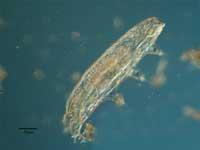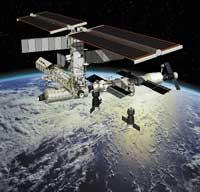To space in the peletón
2008/10/05 Arakistain Aizpiri, Lorea - Elhuyar Zientziaren Komunikazioa
—
—
is not any astronaut. Without any protection, in the peletón, it runs through the empty space and returns to the Earth in good standing. This experiment is not recommended for humans. No, there are films that show that we would be bursting because it is not true that man does not explode in space, but we did not survive more than two minutes. Is it an absurd experiment? Yes, with this radiation therapy and therefore by a cancer recovery pathway if we did not act.
Our hero, the late, better known as water bear, lives in a moist lichen or moss. If it leaves its environment, it stops all biological activity and is expected to return to its environment. In this dream state it is able to withstand the heat, cold and radiation of space.
The trip to space took place in September 2007 in the FOTON-M3 spacecraft of the European Space Agency. In empty space, almost all animals were exposed to cosmic rays. And some even the level of lethal UV radiation. In the hibernation state they managed to maintain the cellular structure until they returned to the water. In the study conducted on the return to Earth, scientists expected the genetic material of the cells to be sore, but it was not so.
The man would not endure
Any other being would not bear it, should be protected to survive in space, the suit of astronauts. However, against the opinion of some film writers, the result of getting naked in space is not spectacular. In Total recall, Arnold Schwazernegger's eyes come out of his place, while astronauts explode his head in Outland. This would not happen.
If man were to go naked into space, radiation and cold would be unsustainable. But above all, it would hurt the lack of pressure. First, the air from the lungs would come out suddenly; if you breathe, the lungs would be. The eardrums would be burst and the body would swell to twice the volume, but it would not explode. However, he would not realize, because lack of oxygen would lose consciousness and drown for two minutes. And it would also suffer more damage. But... in a carelessness, in an accident, if this happens, not everything is lost: in a few seconds it would recover, probably.

Something similar happened to a NASA employee. According to NASA itself, in 1965, at its Johnson space center, the resistance of the costumes was being measured. To mimic the state of space, molecules are extracted to the detectable extent and formed empty. One worker was trapped in one of these vacuum chambers. In fifteen seconds he lost consciousness and the last thing he remembers is that he boils the txistu of the mouth. At twenty seconds, as the pressure of the chamber began to rise, he regained consciousness. The accident left no consequences.
Combat radiation
If the accident had occurred in space rather than in a camera, it would have consequences. Despite withdrawing in time and recovering from pressure damage, damage from UV radiation would not turn. It would suffer severe burns throughout the body.

However, the water bears that traveled into space had no traces of burns. Scientists do not believe that radiation would not damage DNA and believe that these small astronauts were able to remedy it. If so, it would be an opportunity to improve radiation therapy used in cancer treatment. In current treatments, radiation therapy also affects healthy cells.
If special molecules that affect DNA repair were shown, they could be a breakthrough in radiation therapy.
Published in 7K.

Gai honi buruzko eduki gehiago
Elhuyarrek garatutako teknologia





